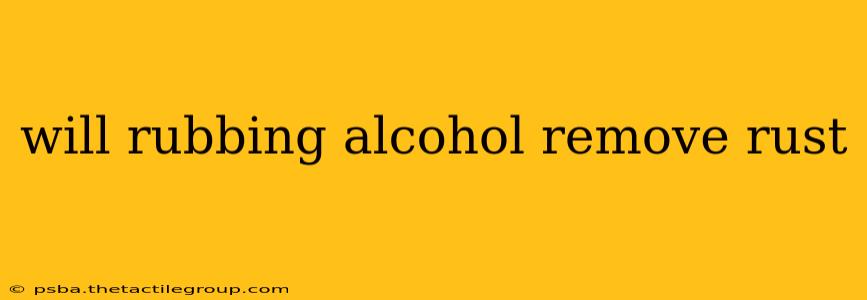Rust. That insidious orange scourge that attacks metal, leaving behind a trail of pitted surfaces and compromised structural integrity. It's a common problem for everyone from car enthusiasts meticulously detailing their prized possessions to homeowners dealing with rusty tools. So, can rubbing alcohol, that readily available household staple, actually tackle this stubborn enemy? The short answer is: not effectively.
Understanding Rust and its Removal
Before we delve into the effectiveness of rubbing alcohol, let's understand the nature of rust itself. Rust is essentially iron oxide, a compound formed when iron reacts with oxygen and water. This chemical reaction is irreversible, meaning you can't simply "undo" it. Rust removal methods focus on either dissolving or physically removing the iron oxide layer.
Why Rubbing Alcohol Fails
Rubbing alcohol, also known as isopropyl alcohol, is a relatively weak solvent. While it can dissolve certain substances, it lacks the chemical potency needed to effectively dissolve iron oxide. Its primary action is as a disinfectant and cleaning agent, not a rust remover. While it might slightly loosen surface rust particles, it won't penetrate and dissolve the bulk of the corrosion. Any apparent success would likely be due to the alcohol's ability to help dislodge loose rust particles, not actual dissolution.
Effective Rust Removal Methods
If rubbing alcohol isn't the answer, what is? Several methods exist for tackling rust, each with varying degrees of effectiveness depending on the severity of the rust and the type of metal:
1. Mechanical Removal:
- Wire brushing: A simple and effective method for light surface rust. Use a wire brush, either manually or with a powered tool, to scrub away the loose rust.
- Sanding: For more stubborn rust, sandpaper (various grits) can be used to gradually remove the affected area. This requires patience and may lead to surface imperfections.
- Sandblasting: A powerful method for removing heavy rust from large surfaces. This requires specialized equipment and should be undertaken by professionals.
2. Chemical Removal:
- Rust converters: These chemical solutions react with the rust, converting it into a stable compound that can then be painted over. This is a popular choice for preventing further rust formation.
- Acid-based cleaners: Products like phosphoric acid are powerful rust removers but require careful handling due to their corrosive nature. Always follow the manufacturer's instructions and wear appropriate safety gear.
- Electrolysis: A more advanced method that uses an electric current to remove rust. This is effective for heavily rusted items but requires specialized equipment.
Conclusion: Choose the Right Tool for the Job
While rubbing alcohol might have some limited usefulness in cleaning a slightly rusty surface, it won't effectively remove rust. For effective rust removal, choose a method appropriate to the severity of the rust and the type of metal involved. Remember to always prioritize safety and use appropriate protective gear when working with chemical rust removers. Consider the size and value of the item before deciding on a removal method—a valuable antique may require professional restoration.

